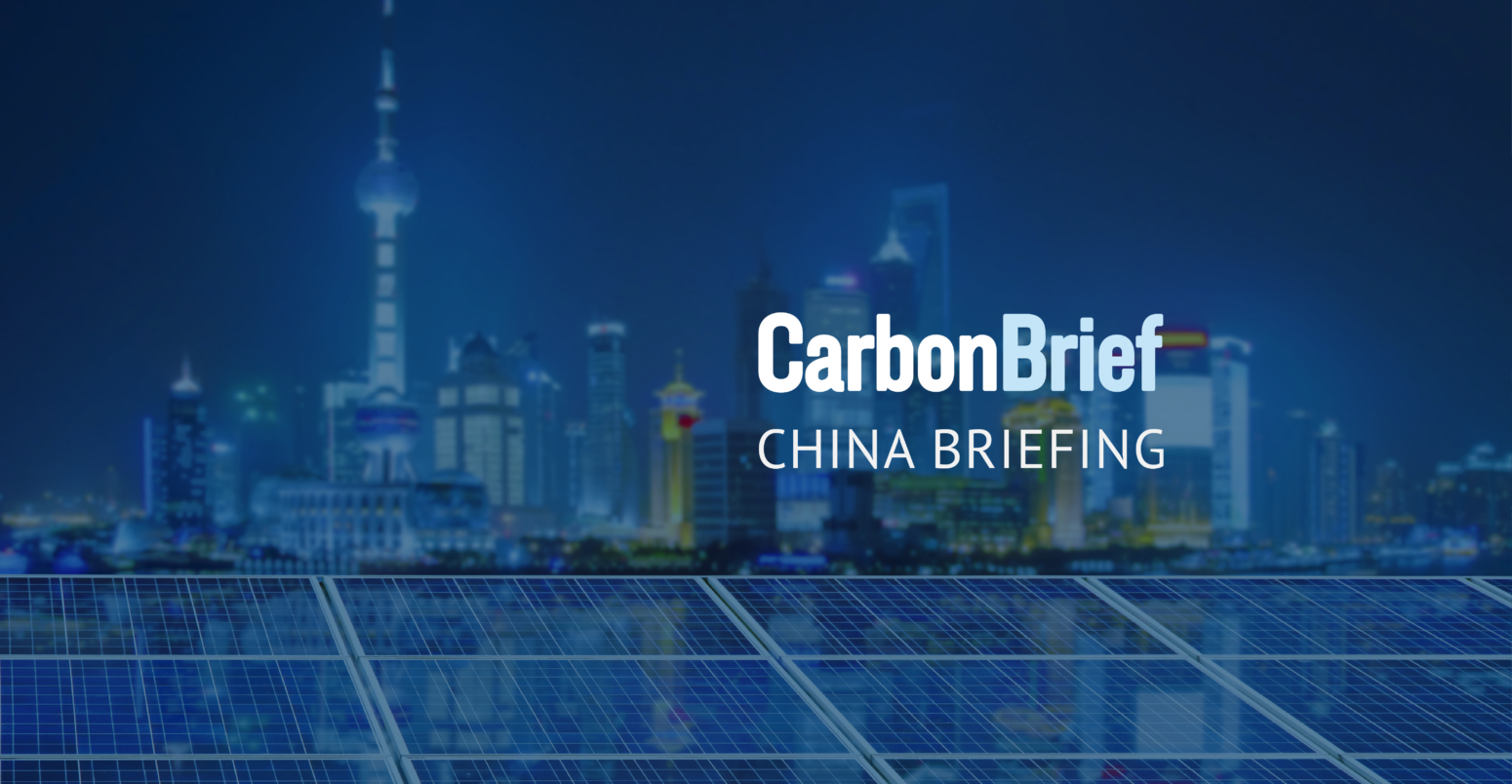
China Briefing, 13 May 2021: Greta Thunberg criticised; Former energy official arrested; EV boom makes ‘richest man’
Carbon Brief Staff
05.13.21Carbon Brief Staff
13.05.2021 | 3:00pmWelcome to Carbon Brief’s China weekly digest.
We handpick and explain the most important climate and energy stories from China over the past seven days.
This is an online version of Carbon Brief’s weekly China Briefing email newsletter. Subscribe for free here.
Snapshot
Greta Thunberg has drawn the ire of China’s state media and web users after urging the country to “drastically” change its emissions trajectory. A hashtag accusing the Swedish climate campaigner of “morally kidnapping” China has gone viral on Chinese social media platforms.

The former deputy head of China’s energy regulator has been formally arrested over bribery charges. Chinese media reported that Liu Baohua had “fallen off his horse” – a Chinese saying for being caught or disgraced – last year and had been under investigation by the national anti-corruption agency.
Meanwhile, a “boom” in electric vehicles (EV) has led to a Chinese physicist being named the richest man in Hong Kong – a powerful title that symbolises the epitome of wealth in China. Robin Zeng Yuqun, worth more than $30bn, co-owns a company that makes EV batteries for international brands, such as Tesla. One news site called him “the Chinese man behind Musk”.
Key developments
Thunberg faces backlash over China emission tweet>
WHAT: Greta Thunberg was widely condemned by Chinese state media and social media users after tweeting about a CNN report of recent US analysis. According to the research, “China’s annual emissions exceeded those of all developed countries combined” in 2019. Thunberg wrote in her post: “We can’t solve the climate crisis unless China drastically changes course.”
WHEN: Thunberg shared the CNN report on Twitter last Friday triggering waves of criticism from China over the weekend.
WHERE: Much of the backlash came from journalists in Chinese media. In addition, a trending topic – entitled “environment-protecting girl morally kidnaps China” – has, as of writing, amassed more than 11m views on Weibo, China’s heavily censored Twitter-like platform.
WHO: “Your PR team should educate u more,” Chen Weihua, the EU Bureau Chief of state-owned China Daily, replied to Thunberg via Twitter on Saturday. The following day, state-run tabloid the Global Times called Thunberg “short of sufficient academic knowledge study” and said she had a “lack of sound self-judgment capability”. State-approved independent news site guancha.cn criticised “foreign media” that had reported the study. DW News, a news and commentary site mostly read by overseas Chinese, accused Thunberg and “the public relations team and interest groups behind her” of “politicising” climate issues.
WHY IT MATTERS: China is sensitive about being reminded of its emission volume, especially by “western” organisations and activists, such as Thunberg. Beijing has been highlighting that the US is “the No1 emitter in history” and China’s per-capita carbon dioxide (CO2) emissions are “much lower than those of developed countries”. State media and pro-China influencers also blamed Thunberg for failing to pressure Japan for its plans to discharge radioactive wastewater into the ocean. The Communist Youth League of China, an influential subsidiary of China’s Communist Party with more than 80m members, described Thunberg’s silence as meaning she has “elastic” standards for environmental protection.
Former senior energy official arrested over bribery charges
WHAT: Liu Baohua, the former deputy director of the National Energy Administration (NEA), has been formally arrested on suspicion of receiving bribes, according to state-run newswire Xinhua. The NEA is China’s energy regulator. A previous government notice said Liu had “illegally accepted enormous amounts” of money and gifts to “interfere in market economic activities” and “use[d] the convenience of his position to seek benefits for others”. Xinhua did not reveal the amount of money he had allegedly taken. (Carbon Brief’s in-depth Q&A explains how corrupted energy officials have impacted China’s climate actions.)
WHO: Liu, 57, is originally from northern China’s Hebei province and had worked in various Chinese energy authorities since 1984, according to state-approved financial outlet Yicai. He had held posts in the now-defunct Ministry of Water Resources and Electricity and State Economic and Trade Commission, among others, Yicai said. He became the NEA’s second-in-command in 2017, it added.
WHEN: Xinhua said on Wednesday that the Supreme People’s Procuratorate, China’s highest organ for legal supervision, had ordered Liu to be formally arrested “recently”. Xinhua did not give an exact date. He had been found to “seriously violate discipline and law” and probed by the nation’s top anti-corruption watchdog since last October, reported financial outlet Caixin. He was expelled from China’s Communist Party and sacked last month, according to state broadcaster CCTV.
WHERE: Liu is now facing prosecution in east China’s Shandong province. China’s Supreme People’s Procuratorate has appointed the People’s Procuratorate of Qingdao to handle the case, Xinhua said.
WHY IT MATTERS: The NEA has been “hit hard by corruption” since its establishment in 2008, Caixin stated in a report from last month. The publication noted that, before Liu, two former NEA directors had been investigated and sentenced. Yicai said that, in 2014, the then-deputy director of the NEA’s coal division was found to have hidden cash worth more than 100m yuan (£10m) at home.
Other news
BATTERY BILLIONAIRE: Physicist and entrepreneur Robin Zeng Yuqun, who owns 25% of CATL, a company that makes EVs batteries, became the richest man in Hong Kong last week, reported South China Morning Post. The publication said 53-year-old Zeng dethroned the city’s long-term top tycoon, Li Ka-Shing, thanks to a “boom in EVs”.
GAS GAME: China is turning to central Asian nation Turkmenistan for more natural gas supplies as Beijing cuts back on Australian energy imports, reported South China Morning Post. Chinese foreign minister Wang Yi called the gas cooperation the “ballast stone” of the two nations’ ties on Monday, according to an official release.
MORE ACTIONS NEEDED: A report from the US thinktank the Center for American Progress found that rising coal consumption, coal-fired power capacity and growing industrial emissions has “undercut” the Chinese government’s “carbon neutrality” pledge. It also recommended that the US engages China in “three key areas” regarding climate issues.
HIDDEN GEM: The Global Times reported that fossils found in south-eastern China’s Fujian Province have indicated that the climate in the region 15m years ago was very similar to the currently predicted global climate in 2100. It noted the discovery could help predict “future environmental changes amid rising concern about climate change”.
METHANE MEASURES: Beijing intends to impose various measures to cut methane emissions, reported China’s 21st Century Business Herald. “As the ‘dual carbon’ goals have been put on the agenda, China’s focus of tackling climate change is also shifting from CO2 to other greenhouse gases,” the outlet said.
US-CHINA COOPERATION: Politico reported that John Kerry, the US special presidential envoy for climate, said on Wednesday that the White House was not merely “relying on somebody’s word” to ensure China meets its climate pledges. Kerry noted that China had “moved somewhat” after concerted climate talks, but forecast more negotiations ahead of the COP26, Politico added.
Extra reading
- Regulators struggle to keep up with China’s growing carbon financing market – Peng Qinqin and Guo Yingzhe, Caixin via the Straits Times
- China tech giants bet $19bn on global electric car frenzy – Bloomberg
- The limits to US–China climate cooperation – Minxin Pei, The Strategist
- Ditching coal should be the goal: China can save money and the world by investing in zero carbon electricity – Matt Gray, Investment Week
New science
An empirical analysis of the environmental performance of China’s overseas coal plants
Environmental Research Letters
A new study has found that China’s overseas coal plants are “cleaner” than those non-Chinese counterparts in terms of CO2 emissions intensity. However, their total emissions are “likely to grow” as a proportion of the coal plant emissions in Asia over time, it adds. The paper compared nearly 2,000 Chinese and non-Chinese coal plants in Asia. Lead author Dr Cecilia Han Springer tells Carbon Brief’s China Briefing: “The carbon footprints of China’s overseas coal plants will determine emissions trajectories for years to come and the Chinese plants will make up an increasing share of the emissions pie.”
The nexuses between energy investments, technological innovations, emission taxes, and carbon emissions in China
Energy Policy
China’s CO2 emission trends between 1995 and 2019 were aggravated by provincial growth and the development of the tertiary or service sector, according to new research. The paper finds that higher energy investments, technological innovation, renewable energy use, expenditure on research and development and carbon emission taxes could facilitate the nation’s carbon-abatement agenda.
Please email any feedback or tips to [email protected]

